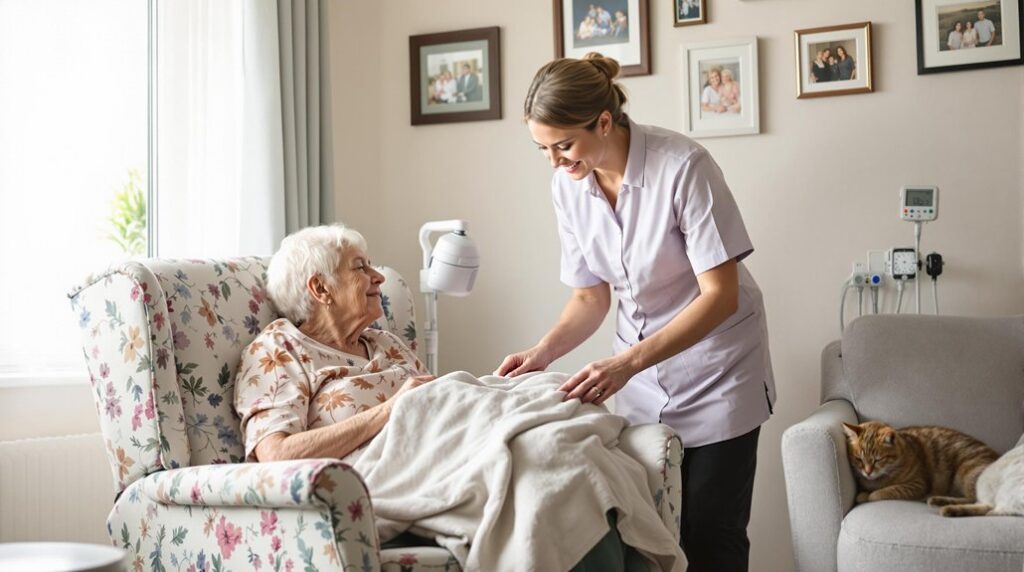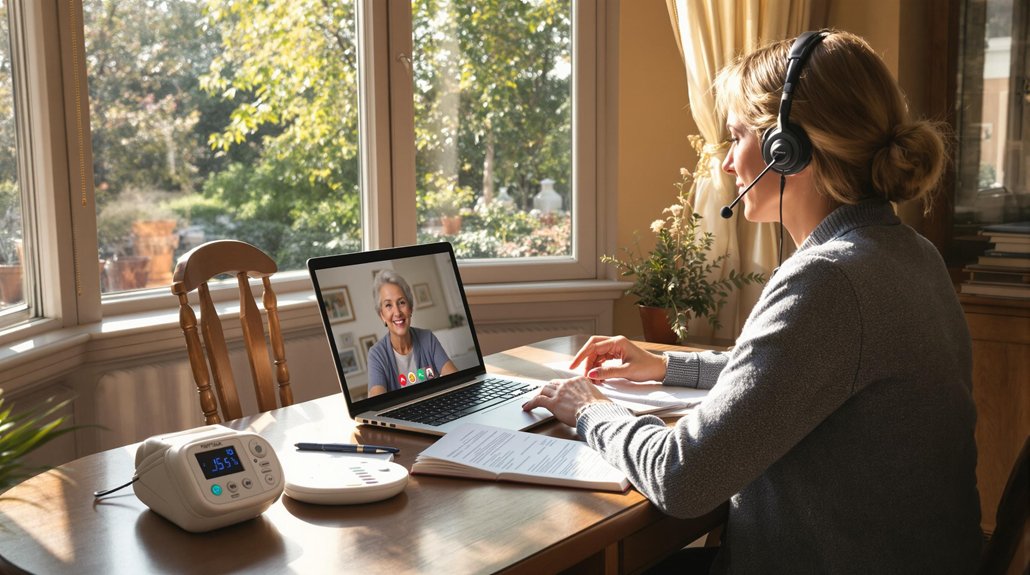In-home care lets you maintain independence and familiar routines while receiving personalized attention in your own space. You’ll get one-on-one care that’s customized to your schedule and needs, though it can cost $20-40 per hour. Nursing homes provide 24/7 medical supervision and structured care in a communal setting for $7,000-12,000 monthly. Your choice depends on your medical needs, budget, and desired lifestyle. Understanding the key differences will help you make the best decision for your situation.
Understanding the Key Differences Between Care Options
When deciding between in-home care and nursing homes, you’ll need to understand their fundamental differences.
In-home care allows your loved one to receive personalized attention in their familiar home environment, with services ranging from basic assistance to skilled nursing care. A caregiver comes to your family member’s residence, maintaining their independence and daily routines.
Personalized care in familiar surroundings helps seniors maintain independence while receiving the support they need at home.
Nursing homes provide 24/7 institutional care in a communal setting, with medical staff and structured activities. They’re equipped to handle complex medical needs and offer constant monitoring.
Caregiver qualifications vary between the two options – nursing homes employ licensed medical professionals, while in-home caregivers can range from certified nursing assistants to registered nurses, depending on your needs.
Your choice will depend on your loved one’s medical requirements, desire for independence, and the level of support you can provide.
With in-home care, families benefit from personalized care plans that address both health and social needs while adapting to changing medical requirements over time.
Cost Comparison: In-Home vs. Nursing Home Care
Although both care options require significant financial investment, understanding their cost structures can help you make an informed decision.
Home care expenses typically range from $20 to $40 per hour, allowing you to customize care hours based on your loved one’s needs. You’ll only pay for the actual time caregivers spend providing assistance, which can result in lower overall costs for those who don’t require round-the-clock care.
Nursing home fees, however, usually involve a flat monthly rate ranging from $7,000 to $12,000, regardless of the level of care needed. This rate covers all services, including meals, housing, and 24/7 medical supervision.
When comparing costs, consider your family member’s specific care requirements, as part-time home care might prove more economical than full-time nursing home care.
With personalized care plans, Sunshine Health Coverage ensures services are tailored to reflect your lifestyle while maintaining independence in familiar surroundings.
Quality of Life and Emotional Well-being
The emotional comfort of familiar surroundings plays an essential role in your loved one’s well-being. When they remain at home, they’ll maintain their daily routines, personal spaces, and cherished memories that contribute to better mental health outcomes.
| Aspect | In-Home Care | Nursing Home |
|---|---|---|
| Privacy | Personal space maintained | Shared facilities |
| Routine | Familiar daily schedule | Structured facility schedule |
| Support | One-on-one attention | Staff rotation care |
Your loved one will receive personalized emotional support from dedicated caregivers who understand their unique needs and preferences. They’ll keep their independence while having assistance when needed. Family members can visit anytime, maintaining strong connections that boost their spirits. Unlike nursing homes, in-home care allows your loved one to age in place, surrounded by the comfort and dignity of their own home. Companion care services help reduce feelings of loneliness and social isolation while keeping seniors actively engaged in daily life.
Level of Medical Care and Professional Support
Both in-home care and nursing homes offer distinct levels of medical supervision for your loved one.
In nursing homes, you’ll find round-the-clock access to medical expertise, with registered nurses and healthcare professionals readily available for emergencies or routine care. Staff members receive ongoing caregiver training and can promptly address multiple medical needs simultaneously.
With in-home care, you’ll typically have one dedicated caregiver who may not possess the same extensive medical background. While many home health agencies provide skilled nursing visits, the level of immediate medical support isn’t as thorough.
However, you can customize the care by hiring specialized medical professionals as needed, and your loved one benefits from one-on-one attention in familiar surroundings.
You’ll need to carefully evaluate your family member’s medical requirements to determine which option best meets their needs.
Through providers like Focus Family Care, seniors can access skilled nursing care that includes specialized services such as wound care and medication management while remaining in their homes.
Independence and Personal Freedom
Beyond medical considerations, personal autonomy plays a considerable role in care decisions. When you choose in-home care, you’ll maintain greater control over your daily routine, from when you wake up to what you eat and how you spend your time. This autonomy benefit can notably impact your overall well-being and satisfaction.
In contrast, nursing homes typically operate on fixed schedules, which may limit your lifestyle choices. While they provide structured environments, you’ll need to adapt to their predetermined meal times, activities, and visiting hours.
At home, you’re free to welcome visitors whenever you want, maintain your preferred sleep schedule, and continue cherished habits like gardening or cooking. You’ll also keep your familiar surroundings, pets, and personal belongings, which can help preserve your sense of independence and dignity. With personalized care plans developed in collaboration with families, you can ensure your unique needs and preferences are honored while receiving professional support.
Social Interaction and Community Engagement
While many assume nursing homes provide more social opportunities, in-home care can offer meaningful social connections that match your personal preferences.
With in-home care, you’ll maintain control over your social calendar and community involvement while receiving support from a dedicated caregiver.
In-home care empowers you to stay socially active on your own terms while having a dedicated caregiver’s support.
Your caregiver can help you:
- Stay connected with neighbors, friends, and family by arranging visits and helping you communicate through technology
- Attend your preferred social activities, from religious services to hobby groups, with reliable transportation assistance
- Participate in community events and local gatherings that align with your interests
- Continue treasured traditions like hosting dinner parties or holiday celebrations in your own home
This personalized approach guarantees you’ll maintain essential social connections while receiving care in familiar surroundings.
Impact on Family Relationships and Dynamics
Choosing between in-home care and nursing homes can greatly impact your family’s relationships and emotional well-being. In-home care often allows you to maintain closer family bonds, as your loved one remains in familiar surroundings where relatives can visit more frequently and naturally.
However, family dynamics can become strained when relatives take on caregiving responsibilities. You’ll need to reflect on how caregiver stress might affect your family’s relationships, as the physical and emotional demands can lead to burnout or resentment.
Nursing homes, while providing professional care, may create different emotional challenges as family members adjust to new visiting routines.
Your choice will influence how your family interacts, communicates, and supports one another during this change. Think about discussing these impacts openly with all family members before making your decision.
Safety and Emergency Response Capabilities
When considering safety measures, both in-home care and nursing homes offer distinct emergency response capabilities.
You’ll find that nursing homes typically maintain structured safety protocols and 24/7 monitoring, while in-home care requires careful emergency preparedness planning tailored to your loved one’s specific needs.
- Nursing homes feature multiple staff members on-site, emergency call systems, and backup power generators for immediate response.
- In-home care can be equipped with personal alert systems, smart home monitoring, and customized safety modifications.
- Nursing facilities maintain standardized emergency protocols and regular staff training for various scenarios.
- Home care settings allow you to create personalized evacuation plans and keep emergency contacts nearby.
Your choice should align with your family member’s medical needs, mobility level, and the available support system in each setting.
Personalized Care Plans and Flexibility
Beyond emergency protocols and safety measures, the level of personalized attention differs markedly between care settings.
In home care allows you to create highly individualized routines that adapt to your loved one’s specific needs and preferences. Through personalized assessments, caregivers can develop and modify care plans that evolve with changing conditions.
You’ll find that in-home care offers more flexible scheduling options compared to nursing homes’ structured routines. Your family member can maintain their preferred daily rhythm, from meal times to sleep schedules. They won’t need to conform to institutional timetables or shared facility schedules.
This flexibility extends to visiting hours, activity choices, and even the selection of caregivers who best match your loved one’s personality and needs. The result is a more comfortable, familiar, and accommodating care experience.
Long-term Financial Planning and Insurance Coverage
Although the initial costs of in-home care may seem higher, understanding the long-term financial implications of both care options is essential for making an informed decision.
You’ll need to carefully evaluate your insurance options and potential long term savings while considering these key financial aspects:
- Many insurance policies cover both in-home and nursing home care, but you’ll need to verify specific coverage limits and eligibility requirements for each option.
- You can often customize in-home care hours to match your budget, potentially reducing overall costs compared to full-time facility care.
- Consider tax deductions and credits available for both types of care, as these can greatly impact your long-term financial planning.
- Evaluate whether combining different insurance options, such as long-term care insurance with Medicare supplements, could maximize your coverage while minimizing out-of-pocket expenses.
Conclusion
After looking at all your options, including costs and how everyone feels, the choice between in-home care and nursing homes comes down to what works best for your family. Think about your loved one sitting in their favorite chair, surrounded by cherished photos and memories – that’s what in-home care offers. Nursing homes provide important medical care, but there’s something special about staying in a place filled with comfort and familiar faces.
Remember, you’re making this decision out of love. Just like every family is unique, every care situation is different. The right choice is the one that brings comfort to both you and your loved one, helping everyone sleep better at night knowing they’re well-cared for.
You don’t have to figure this out alone. Many families face these same questions, and there are caring people ready to help you find the best path forward.
If you or a loved one need help, don’t wait. Reach out to Focus Family Care today at (561) 693-1311 or email us at info@focusfamilycare.com.




